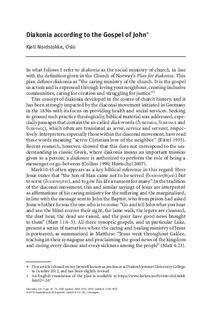| dc.description.abstract | The Gospel of John is often considered less important in providing material for a biblical reflection on the understanding of diakonia, conceptualized as the social ministry of the for a the church, due to the fact that the diak-words (diakonia, diakonein and diakonos) do not have the same central role in this gospel as compared with the synoptic gospels. There are, however, other approaches to discovering the diaconal message in the Forth Gospel and its important role in the ministry of Jesus. This article points to the seven narratives of signs presented in John 2-11, interpreting them as diaconal both in the sense that they announce Jesus as a defender of human dignity, justice and life, and as examples of what it means to follow Jesus, incarnated in human reality. Upon reading the signs in this perspective, seven themes – shame, vulnerability, exclusion, hunger, fear, guilt and death – are identified that give meaning to interpreting them in today’s context, with special reference to diaconal challenges and practices. | |
